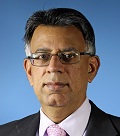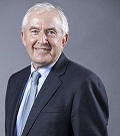CFA Institute 10 February 2022
The Pandemic's Impact on Shareholder Activism
CFA Institute Alpha Summit APAC
Virtual Session: Video On Demand
Overview
CFA Institute Alpha Summit APAC, a two-day virtual conference focusing on the investment industry’s biggest challenges and most compelling trends across Asia Pacific, was held on 10-11 February 2022.
Over the past decade, shareholder activists and — more recently — ESG activists have made significant progress in the Asia-Pacific region. Their efforts put errant managements on notice, led to regulatory reforms, enhanced shareholder influence, improved governance and set encouraging examples for others to follow. What are the key lessons to learn from recent cases of successful shareholder activism in Japan, Australia, and other markets in the region, and are there limits to activism? How should various investors engage with companies to drive positive changes in corporate governance as they emerge from the pandemic?
Speakers:
- Nicholas Allen, chair and independent nonexecutive director, Link Asset Management
- Amar Gill, head of investment stewardship APAC, BlackRock
- Yoo-Kyung Park, head of responsible investment and governance APAC, APG Asset Management
- Dr. David Smith, CFA, senior investment director, abrdn.
Moderator:
- Sivananth Ramachandran, CFA, director of capital markets policy, India, CFA Institute
Watch the Video
Length: 64 min. Recorded: 10 February 2022.
Synopsis
How Investor Activism Differs from Active Stewardship
Smith clarifies the differences between activism and stewardship, “You have activist investors who take a stake in a company and propose changes.” He also explains that these could relate to special dividends, restructuring, or other activities that could drive a short-term spike in the company’s share price. The activist then sells their shares at a profit. The alternative, stewardship, sees investors engage with a company to pursue positive change.
Special attention is given to the achievements of Asian-based investors over the past decade. According to Smith, solid progress is being made with company engagement, citing “much greater sophistication” around proxy voting and “continued engagement on a broader series of factors across the industry.” Meanwhile, Asian companies are now more receptive to engagement outreach by asset managers, particularly in the wake of the pandemic. “I think the corporate side is opening up quite a lot,” adds Park.
A Maturing Engagement Process
Allen suggests that profit-motivated judgements develop into decision making that addresses wider stakeholder concerns. He notes that the interaction between boards and shareholders has assumed greater importance.
The panel then looks at the difficulties that arise when seeking engagement with family-owned companies, an area in which Smith has considerable expertise. “Families tend to think across generations,” he says, “So, I spend a lot of time performing due diligence on families, as much as the businesses themselves, and if we can co-invest with the right family and let them get on with running their business, that’s a great outcome.”
Financial Companies: Logistics of Effecting Change
The panel reviews what constitutes a successful institutional engagement strategy for asset managers, including working with investor relations teams and when to escalate a private dialogue with a company into the public sphere.
Park introduces the term “logistics of engagement,” pointing to a common feature in all her company’s investments that centres around in-depth environmental, social, and governance analysis. “Once that is done, we have a good idea of what should be our engagement priorities,” she says.
Gill raises an important point relating to the power of an active shareholder. He explains that, in the event of objecting to a board proposal, it is not essential to win the vote to underline the strength of opposition. “Quite often, there may be a vote against a director, and it might be that only 10 percent of the shareholders voted against the director’s re-election. But that is already a strong signal that shareholders have serious concerns.”
Smith highlights the importance of timing—finding the right moment to move from engaging with the company behind closed doors to a more public setting. This involves a detailed assessment of whether it may be wrong or damaging to the company if the subject under discussion is shared with a broader audience. He points out that negative connotations can be associated with “staying behind closed doors.” He believes, however, that it’s natural not to want sensitive discussions appearing on the front pages of the financial press.
The Importance of Collaboration
The panel also examines the essential part collaborative engagement plays in helping address systemic issues. Furthermore, it highlights the importance of holding diverse views among board members and other stakeholders, with Nick noting, “If everybody had the same view, it would be easy, and it would be wrong.”
CFA Institute Alpha Summit APAC 2022
Virtual Sessions - Video On Demand:
Day 1:
- Welcome and Opening Remarks: Think Beyond the Horizon
- Fireside Chat: Progress in Greening the Financial System—Lessons Learned and Looking Forward
- Panel Discussion: Climate Change Risk – Action for Industry Stakeholders
- Panel Discussion: Global and Regional ESG Regulations and Standards – Implications for the Financial Services Industry
- Panel Discussion: The Pandemic’s Impact on Shareholder Activism
- Keynote and Fireside Chat: SDG Investing
Day 2:
- PGIM Sponsored Session: 2022 Best Ideas - The Road to Renewal
- Panel Discussion: Managing Pension Funds for Sustainable Long-Term Return
- Panel Discussion: Trends and Changes in Capital Markets Formation
- Fireside Chat: Future of the FinTech Eco-System
- Panel Discussion: Investment Management Professional of the Future
Speakers
Amar joined BlackRock in 2018 after 22 years with CLSA, a regional industry leader for independent equities research, where he rose to become Head of Asia Research. Amar is a pioneer in regional corporate governance research, writing nine reports for CLSA between 2001 and 2014 in collaboration with the Asian Corporate Governance Association (ACGA). He graduated with first class honours in philosophy, politics and economics, and did a master’s in philosophy majoring in ethics at Oxford University. He is presently on the Asia advisory group of Climate Action 100+, as well as the Young Investors Society.
David leads abrdn’s ESG research and integration activity in Asia and oversees the day-to-day running of the Asian Sustainable Development Equity Fund. He is also responsible for engaging with the board members and management teams of abrdn’s investee companies across the region. Before joining abrdn in 2011, he worked for ISS, where he headed up the Asia (ex-Japan) research team. David has a PhD in corporate governance and a master’s degree in corporate strategy and governance from the University of Nottingham. He also has a bachelor’s degree in business economics from the University of Wales.
Along with his duties at Link Asset Management, Nicholas is an independent non-executive director at CLP Holdings, Hong Kong Exchanges and Clearing, and Mordril Properties. Following his retirement as a partner at PricewaterhouseCoopers in 2007, Nicholas served as an independent non-executive director at Hysan Development Company, Lenovo Group, and VinaLand. Nicholas holds a bachelor’s degree in economics and social studies from the University of Manchester. He is a Fellow of the Institute of Chartered Accountants in England and Wales and a member of the Hong Kong Institute of Certified Public Accountants.
YK Park oversees the implementation of responsible investment policies for APG Asset Management’s client base. Her geographic coverage encompasses the entire Asia-Pacific region, including Japan and Australia. YK actively engages with portfolio companies, market regulators, exchanges, and institutional investors on corporate governance, the environment, social policy, and corruption. Before joining APG, YK spent more than ten years as a securities analyst in the investment banking sector, where she focused on a range of industry sectors, such as utilities, transportation, steel, chemicals, and refining.
Sivananth "Siva" Ramachandran, CFA, is the Director of Capital Markets Policy, India at CFA Institute. In his role, he is responsible for advocating policy positions on issues that impact Indian capital markets, including corporate governance, ESG, and financial reporting, to name a few. Siva was part of a SEBI working group that reviewed the related party transaction regulations. He is frequently quoted in media. Siva has nearly 13 years of experience in financial services. Prior to joining the CFA Institute, he spent five years at Morningstar, and led their global index product development team. He also served as a spokesperson for sustainability at Morningstar India. Prior to his time at Morningstar, Siva spent nearly five years at MSCI where he co-authored research papers on small cap investing, portfolio construction, and economic exposure. Siva has an MBA from the Indian Institute of Management, Lucknow. He also holds the chartered financial analyst (CFA) and professional risk management (PRM) designations, and the fundamentals of sustainability accounting (FSA) credential provided by the Sustainability Accounting Standards Board (SASB).






